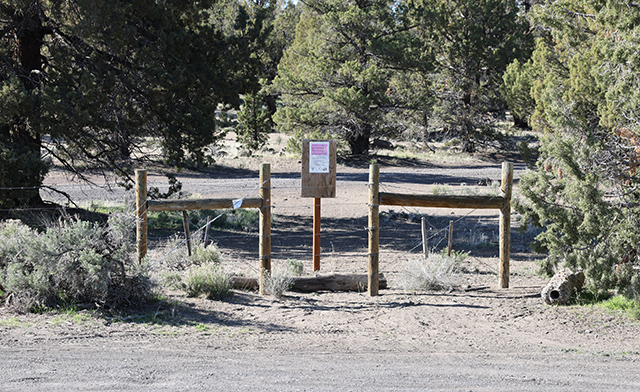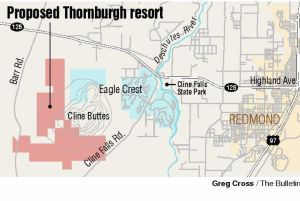Deschutes County backs Thornburgh resort plan — again
Published 1:19 pm Tuesday, August 5, 2025

- Signs and fencing located on the southern portion of the Thornburgh property near Tumalo. (Dean Guernsey/The Bulletin)
Confederated Tribes of Warm Springs say treaty rights were ignored in decision
The Deschutes County Commission has approved plans for the 2,000-acre Thornburgh destination resort, once again siding with developers in a heavily contested land-use battle.
But opponents say the fight is far from over.
Plans for the 2,000-acre resort located between Redmond and Sisters— to include 950 homes, golf courses, a private lake and clubhouse — were first given land use approval more than 20 years ago. Since then it has become one of the most litigated cases in Oregon history.
Trending
The latest issue is whether water used for golf courses and homes will impact fish in the Deschutes River Basin — and whether those impacts would harm 170-year-old tribal treaty rights to harvest the fish.
That issue wasn’t properly addressed by the county commission when the mitigation plans were first approved in 2023, according to an Oregon Court of Appeals decision from last year. The appeals court decision was considered a win for the Confederated Tribes of the Warm Springs and others in a larger fight over consideration of treaty rights in local decisions about land use and development.
But the county’s July 23 decision argued the resort’s water use plan doesn’t violate fishing rights.
Commissioners Tony DeBone and Patti Adair backed the resort, with commissioner Phil Chang voting against.
That could result in continued opposition from the tribes taking the lengthy Thornburgh case outside the confines of the state’s land use system. During a May 7 public hearing, Josh Newton, a lawyer for the tribs, suggested the tribes might be willing to take the case to federal court in order to protect treaty fishing rights. A press release following the county’s decision said the tribes are “exploring additional actions, up to and including an appeal to the Oregon Land Use Board of Appeals.”
“Fish are as important to them as the atmosphere they breathe,” Newton said. “It’s not a brand. It’s not a label. It’s core to who they are. So they’ll do what they have to.”
Trending
A spokesperson for the Confederated Tribes of the Warm Springs told The Bulletin Monday the tribe is still deciding on next steps.
County says habitat standards satisfy treaty obligations
The resort’s amended plan reduced water use by 35%, while letting any unused water rights remain in the streams and cutting thousands of water-sucking juniper trees on the site. Thornburgh developers argued in May that technical reports written by environmental consultants showed the resort’s water use would not have a significant impact — and in fact a net benefit — on the Deschutes and Crooked River basins by slightly increasing flows and reducing temperatures.
“For 20 years or so, we’ve been told that we should build less golf, use less water,” Thornburgh developer Kameron DeLashmutt told the board in May. “We heard those claims, and we did just that.”

A map shows the 2,000-acre Thornburgh destination resort west of Redmond.
The county determined Thornburgh meets the “no net loss” standard for destination, meaning it must make up for any impacts on fish and wildlife. Therefore, the county said, there is also no impact to the treaty between the tribes and federal government that guarantees the right to harvest fish in usual and accustomed places.
The county also explained in its July 23 decision the no net loss standard can be met “without showing that each individual species will be maintained or replaced on a one-to-one basis.”
Tribal lawyers argued Thornburgh’s analysis doesn’t go far enough to determine impacts on individual species — and would not be able to do so unless tribes were able to participate.
As the county prepared for the most recent Thornburgh hearing, it closed the record to new evidence related to the issue of tribal treaty rights.
“This decision dishonors Warm Springs’s constitutionally recognized 1855 Treaty, which guarantees our rights to enough water to sustain our people and fish,” said Dennis White III, Chairman of the Confederated Tribes of Warm Springs Tribal Council, in a press release. “The plain and simple fact is we were not consulted about our people’s resources, and our tribal ecological knowledge continues to be ignored. That is not how governments show mutual respect for each other.”
In the 1855 treaty, tribes ceded 10 million acres and reserved the right to harvest fish from usual and accustomed places. Since then, federal court decisions in the Pacific Northwest have established a “large body” of case law limiting the power of states to restrict management of tribal fisheries and establishing the tribes as co-managers of the resource, according to the Columbia River Intertribal Fish Commission.
Newton, the tribe’s lawyer, said tribal leaders are asking the question of whether the state land use system is “capable of delivering justice to the tribe.”
“We feel sorry for the board,” he told the county commission May 7. “You have a ton of information that is almost so complicated it’s impenetrable.”
Others continue opposition
Land use group Central Oregon LandWatch said it plans to take the county’s decision to the Oregon Land Use Board of Appeals. That board upheld the county’s decision after appeals by LandWatch and others in 2023.
Paul Lipscomb, a former Marion County Judge who lives in Sisters, has been opposing the resort for years, and says he plans to appeal again to the land use board.
“For me, the biggest single issue is water,” Lipscomb said in an email. “However it might be managed, turning a high desert sage brush savanna into several golf courses, with artificial lakes, greens and fairways that need daily water infusions, is insanity.”









